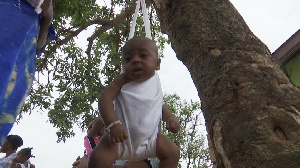 Unavailability of a Child Welfare Clinic (CWC) poses a challenge to health care delivery
Unavailability of a Child Welfare Clinic (CWC) poses a challenge to health care delivery
Access to quality primary health care is a fundamental human right and central in the performance of health care systems, however children in Agotikope, Kokoma and Sabahman in the Ga West Municipality in Accra are experiencing greater barriers in accessing quality Health Care, with some parents having to go through toils to get their children immunised.
This problem is however worsened for nursing mothers due to the lack of child Welfare Clinics in these communities.
Ayisha Abdul Rahman, Ellen Navadzi, and Edem Devah are all nursing mothers who have lived in Agortikope for more than a decade. They have children between the ages of 6 weeks, twelve months and eighteen months respectively.
They complain, that the unavailability of a Child Welfare Clinic (CWC) poses a challenge to health care delivery.
The three, just like other nursing mothers are worried that if urgent steps are not taken to provide CWC, children in Agotikope and its neighbouring communities Kokoma and Sabahman in the Ga West Municipality will experience greater barriers in accessing quality Primary Health Care.
The CWC, popularly known as “weighing” in Ghana is a free service that allows parents with children below two years of age get weighed and immunized with Ghana Health Service-approved vaccines.
The services are mostly rendered in public health facilities and a few private ones.
Weighing under trees:
However, Agotikope, Kokoma and Sabahman, all in the Ga West Municipality have no CHPS compounds or health facilities; hence CWC is done in the form of outreach in the communities
There is no shed or temporary structure to house service providers or service users during sessions. Services are usually rendered under a tree, implying the unavailability of services during rainfall and in some cases the truncation of services.
Vinolia Atsu, a senior Public Health Nurse in the area explained how devastating the situation is and its adverse impact on healthcare delivery to children.
According to her, due to the lack of chairs, parents have to stand on their feet or sit on the floor while the services are being rendered.
Parents who are unable to stand for long have no option than to carry chairs from their various homes. There is an absence of a weighing stand during the Agotikope CWC sessions.
Children tied against trees:
According to Francisca Dickson Arhin, to improvise, a rope is tied to a tree during weighing, a situation that suddenly swings the children and is likely to injure children during CWC sessions.
The length measuring device is also laid on the bare sandy floor with the risk of dust destroying the device. Operating the length device from the floor also causes discomfort for staff as they are required to frequently bow during its use.
As of the end of August 2020, CWC had been called off twice at Agotikope and it environs due to rainfall, hence, children who are due for vaccination may miss their immunization schedules during unfavorable weather conditions and may never be immunized.
Emmanuel A.K. Amuzu, an assembly member in the area expressed worry over the situation, calling for urgent attention from health authorities.
Municipal officer:
Municipal Planning Officer for the Ga West Municipal Assembly, Samuel N. laweh said lack of funds is hindering plans to establish a CHPS compound for Agortikope and its environs but assured the assembly would do its best.
Ghana has made significant strides in eliminating vaccine preventable diseases. Notwithstanding the remarkable progress in coverage, there exist funding gaps that require critical attention if the SDG 3 and other national and international policies are to be achieved.
Since becoming a member of GAVI’s Learning Network for Countries in Transition the country has not been meeting its obligation to the GAVI agreement and its contributions to Routine Immunization have been declining rather than closing the existing gap to the expected figure of Learning Network for Countries in Transition.
Considering the fact that the cost of treating vaccines preventable diseases is sixteen times higher the cost of immunization, Government must be deliberate about closing the financing gap and addressing immunization related challenges.
Send Ghana
SEND GHANA however anticipate that for Ghana to be able to fund all immunization related costs by 2027 per the GAVI transition plan, there should be requisite planning by the government to provide adequate resources for the health sector in the annual budget.
To advance this cause, the Immunization Advocacy Initiative, being undertaken by SEND GHANA, Hope for Future Generations and Ghana Coalition of NGOs in Health seeks to attain a Sustained annual financing for immunization in the Government of Ghana national budget and also Increase disbursement and spending of the proportion of the budget allocated to immunization by the Government of Ghana.
Child Welfare Clinic is a free service that allows parents to have babies below two years of age get weighed and immunized with Ghana Health Service-approved vaccines. Also present are personnel from the Ghana Births Registry who assists with the securing of birth certificates for babies born within the district.